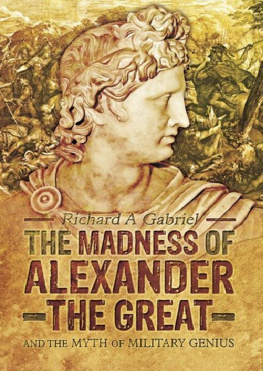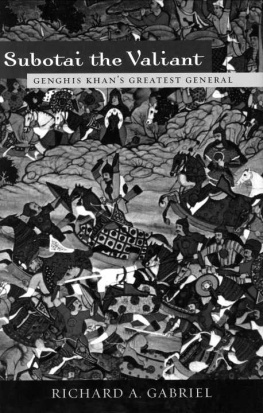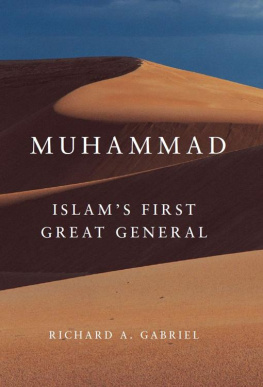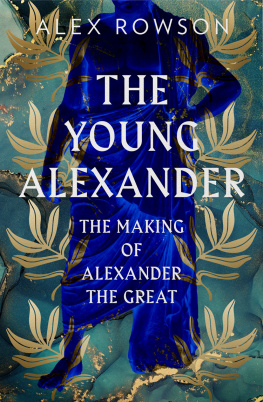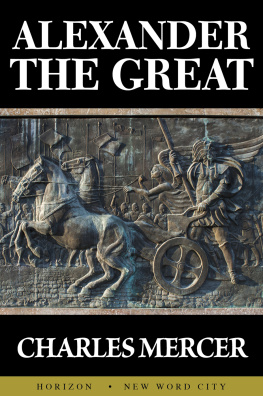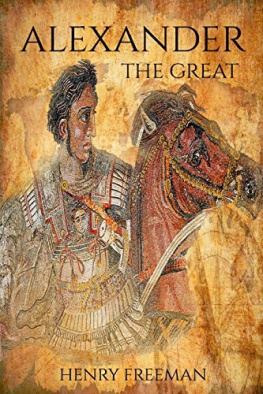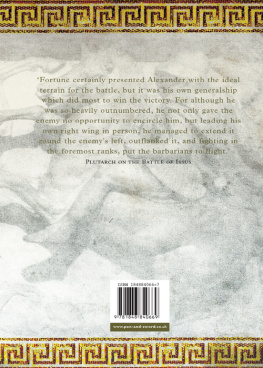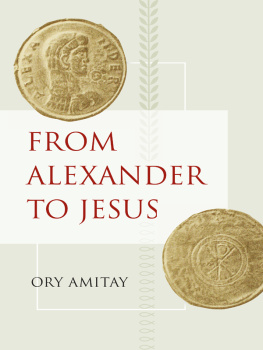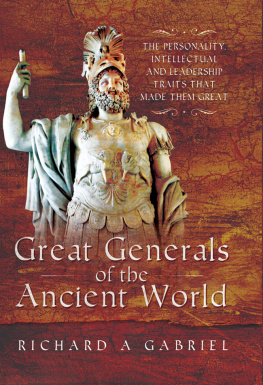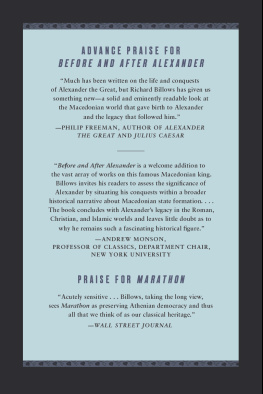First published in Great Britain in 2015 by
PEN & SWORD MILITARY
an imprint of
Pen & Sword Books Ltd
47 Church Street
Barnsley
South Yorkshire
S70 2AS
Copyright Richard A. Gabriel, 2015
ISBN: 978-1-78346-197-4
EPUB ISBN: 978-1-47385-236-5
PRC ISBN: 978-1-47385-242-6
The right of Richard A. Gabriel to be identified as the author of this work has been asserted by him in accordance with the Copyright, Designs and Patents Act 1988.
A CIP catalogue record for this book is available from the British Library.
All rights reserved. No part of this book may be reproduced or transmitted in any form or by any means, electronic or mechanical including photocopying, recording or by any information storage and retrieval system, without permission from the
Publisher in writing.
Typeset by Concept, Huddersfield, West Yorkshire, HD4 5JL.
Printed and bound in England by CPI Group (UK) Ltd, Croydon CR0 4YY.
Pen & Sword Books Ltd incorporates the imprints of Pen & Sword Archaeology, Atlas, Aviation, Battleground, Discovery, Family History, History, Maritime, Military, Naval, Politics, Railways, Select, Social History, Transport, True Crime, and Claymore Press, Frontline Books, Leo Cooper, Praetorian Press, Remember When, Seaforth Publishing and Wharncliffe.
For a complete list of Pen & Sword titles please contact
PEN & SWORD BOOKS LIMITED
47 Church Street, Barnsley, South Yorkshire, S70 2AS, England
E-mail:
Website: www.pen-and-sword.co.uk
DEDICATION
For my beloved Susan,
who makes my heart sing
and for
Archie Frangoudis
Ray Grenier
Arnie Macalmont
Roger Pritchard
Frank Sousa
All old men now, but once young, when they
answered their countrys call to service and war
Thank you
Introduction
Of all the subjects that have occupied the study of ancient military history, none has done so more than Alexander the Great. An online bibliographic search reveals no fewer than 4,897 books about Alexander and another 16,000 or so published academic journal articles and popular magazine pieces.1 What strikes one as remarkable is that this outpouring of Alexander scholarship is rooted in only five basic ancient sources, only one of which was written during Alexanders lifetime. There were some twenty other contemporary sources, but only one has survived.
The only source contemporary with Alexander is Nearchus chronicle of the sea voyage from India to Persia, following Alexanders Indian campaign. It survived because it was incorporated into Arrians later work. Nearchus was a boyhood friend of Alexander, and his appreciation of Alexanders psychology is worth more serious consideration than it has often been given. The other ancient sources are Diodorus Siculus (80-20 BC), a Sicilian Greek, who devoted one of the forty books of his universal history to the life of Alexander; Quintus Curtius Rufus; the dates of Curtius life are unknown, and the subject of much debate. He wrote the only history of Alexander in Latin and some say he wrote during the reign of Emperor Claudius (41-54 AD), others attribute his writing to Vespasians (69-71 AD) reign, and Plutarch (45-120 AD), perhaps the best known of the ancient sources, who provides much of the information about Alexanders youth available to us. Lucius Flavius Arrianus (Arrians) work is generally considered to be the more reliable of these vulgate sources because the author drew upon accounts, now lost, written by two of Alexanders senior staff officers, Aristobulus and Ptolemy. As is often the case in studies of ancient history, everyone is dependent upon the same sources.2
What we are left with, then, are the interpretations of the sources that this or that historian chooses to emphasize. The result is literally thousands of books and articles that offer different perspectives on Alexander and his life. There is, of course, no good reason why this book ought to be different, and it isnt. However, I have been researching and writing books and articles on ancient history for more than forty years, and in the process have examined a good deal (but by no means all!) of the literature on Alexander. Despite the insightful analyses of many classicists, historians, linguists, and others whose works comprise the extant body of literature on Alexander, it strikes me that one of the most basic aspects of Alexanders life has gone largely unexamined.
The most basic and unavoidable fact of Alexanders life was that he spent some thirteen years at war, virtually all his adult life. His very existence was characterized by constant exposure to violence, death, the slaughter of women and children, the destruction of villages and towns, the loss of friends and comrades, and his own exposure to death and wounding. These experiences often left Alexander spattered with the blood, brains, and gore of his victims, for war in ancient times was conducted at very close quarters indeed, and Alexander was an enthusiastic participant in its waging. Alexander was a very different person at the end of his life than he was at the beginning, before he experienced the horrors of war, and was suffering from almost every symptom of what we now call post-traumatic stress disorder.
This book offers an examination of Alexanders personality and war experiences to answer the question of whether Alexander suffered from post-traumatic stress disorder and other psychiatric conditions that can reasonably be explained by his prolonged exposure to war, and to the injuries, physical and psychiatric, he received during that exposure. The focus arises out of my experience as a US Army officer assigned to the Department of Combat Psychiatry at the Walter Reed Army Institute of Research in Washington DC. in the mid-1980s. While there, I became interested in the problem of combat and war related stress of Vietnam veterans. This led to further research, some of it with the Israeli Defence Force, and the publication of two books and several articles on the subject.
While on the faculty of the US Army War College a few years later my research interests shifted to the field of ancient military history, particularly to the subject of military leadership and the great commanders of ancient armies. This emphasis led to the publication of a number of books, including several biographies of the great captains of the ancient world. In the last few years, however, my interests shifted again, this time to the history of military physical and psychiatric medicine as it developed from ancient times to the present. The result has been the publication of my two histories of the subject. I mention all this only to establish that I have some limited expertise in the subject areas that this book addresses.
When the opportunity arose from a British publisher to attempt a work on Alexander, my thinking naturally centred around my previous research. I have attempted to combine my previous areas of research interest in the present book by posing three questions about Alexander that, for the most part, have been largely ignored by other scholars of the subject. Firstly, did Alexander suffer from psychiatric symptoms due to his long exposure to war and, if he did, how did this affect his personality and behaviour? Secondly, were Alexanders wounds as serious as portrayed in the sources, or are they exaggerated accounts, some of which were impossible to have survived given the state of Greek military medicine at the time? An important aspect of the analysis of Alexanders wounds is an investigation of the severe head injury he suffered in 328 BC at Cyropolis. This head injury has gone largely unaddressed by Alexander scholarship even though it is crucial to explaining Alexanders behaviour. Thirdly, compared to other generals of antiquity, was Alexander really a great general as is often supposed, or something quite less? It should be obvious that this book does not purport to present a complete compendium of Alexanders life, but only offers some new perspectives on selected aspects of it, some new ways of thinking about one of military historys most famous subjects.
Next page
